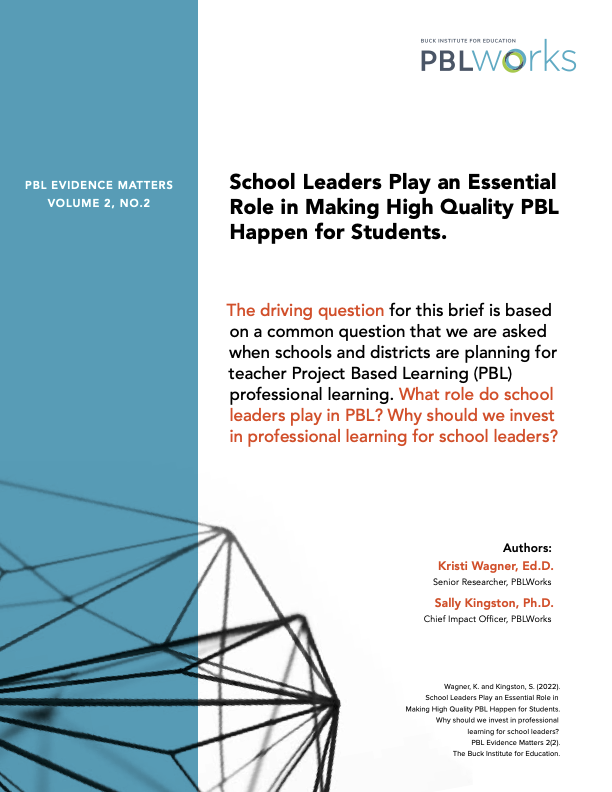Research Publications
From K–12 to Higher Ed: Expanding Project Based Learning Pathways for Career Readiness
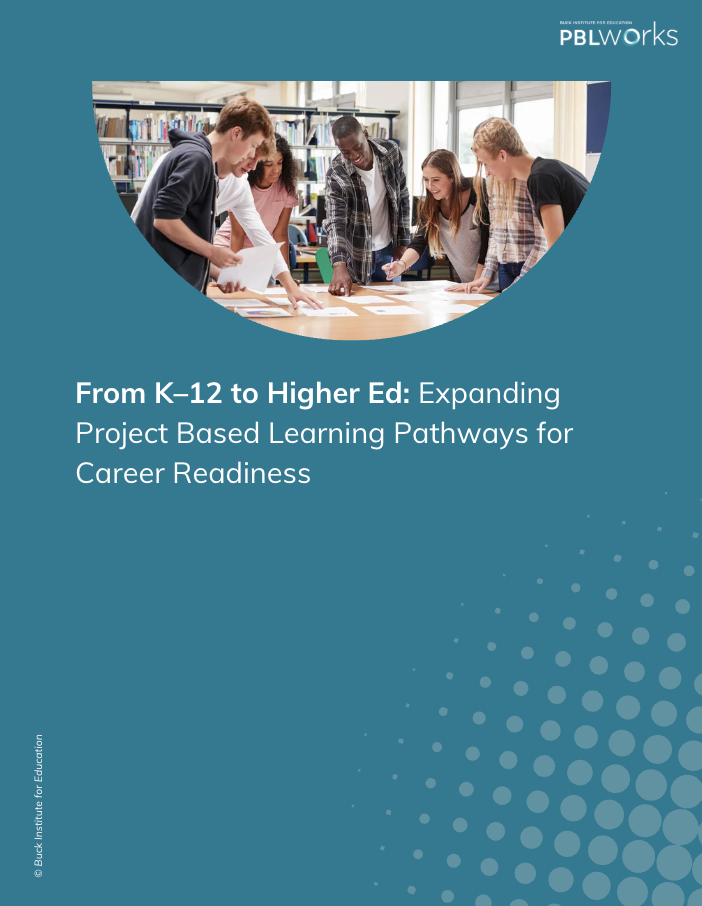
This PBLWorks report explores how expanding Project Based Learning (PBL) from K–12 into higher education better prepares students for career readiness and civic life while offering deeper insights into effective teaching and learning. Spotlighting Western Michigan University’s success, it shows that PBL in higher education is not a radical departure but a natural extension of proven practice. Grounded in faculty experience and documented outcomes from pilots like WMU’s cross-college cohort, PBL equips students with disciplinary knowledge and essential success skills, building a continuous pathway of authentic, inquiry-driven learning.
Download the report (pdf)
Student-Centered Assessment in Project Based Learning
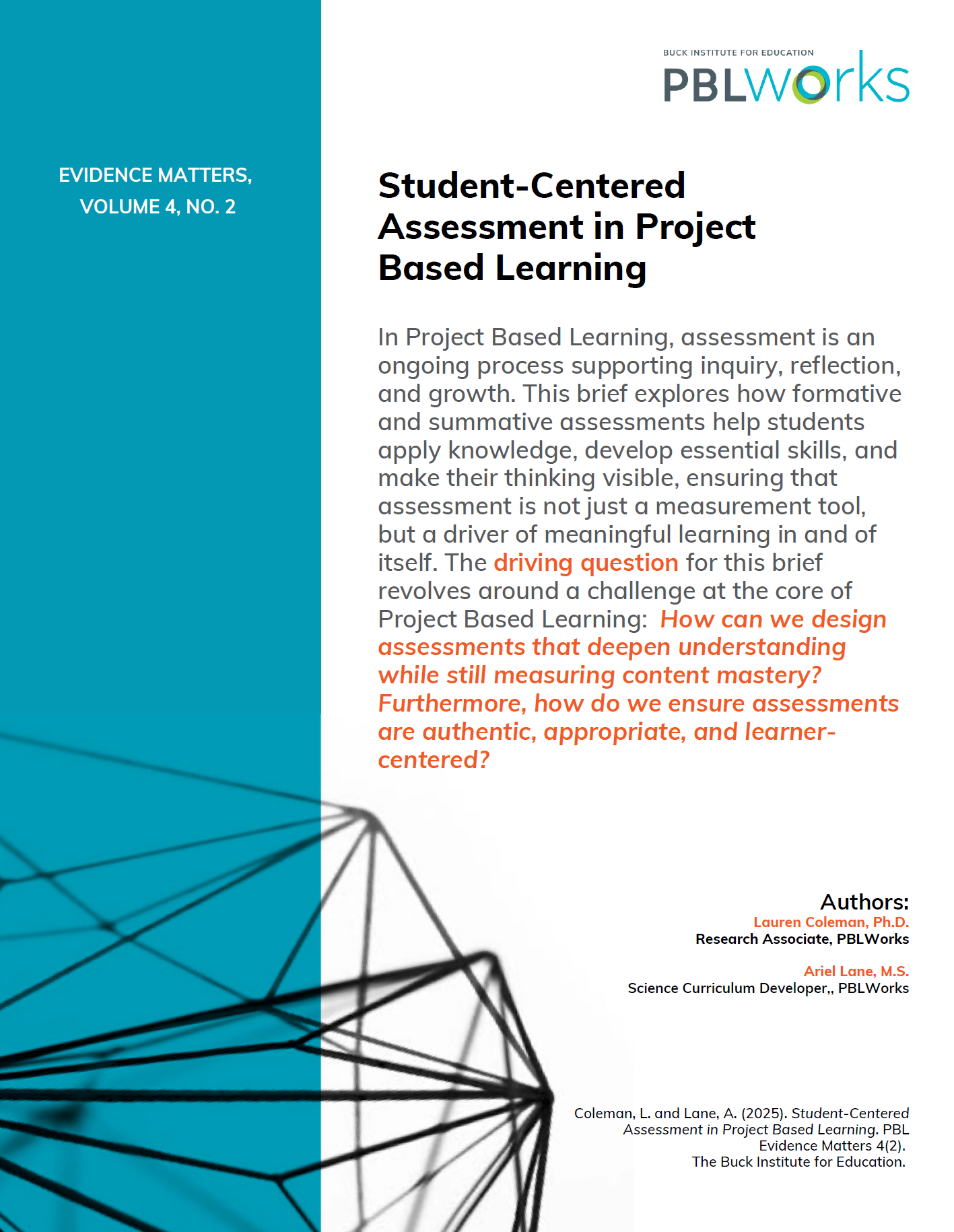 In Project Based Learning, assessment is an ongoing process supporting inquiry, reflection, and growth. This brief explores how formative and summative assessments help students apply knowledge, develop essential skills, and make their thinking visible, ensuring that assessment is not just a measurement tool, but a driver of meaningful learning in and of itself. The driving question for this brief revolves around a challenge at the core of Project Based Learning: How can we design assessments that deepen understanding while still measuring content mastery? Furthermore, how do we ensure assessments are authentic, appropriate, and learner-centered?
In Project Based Learning, assessment is an ongoing process supporting inquiry, reflection, and growth. This brief explores how formative and summative assessments help students apply knowledge, develop essential skills, and make their thinking visible, ensuring that assessment is not just a measurement tool, but a driver of meaningful learning in and of itself. The driving question for this brief revolves around a challenge at the core of Project Based Learning: How can we design assessments that deepen understanding while still measuring content mastery? Furthermore, how do we ensure assessments are authentic, appropriate, and learner-centered?
Citation: Coleman, L. and Lane, A. (2025). Student-CenteredAssessment in Project Based Learning. PBLEvidence Matters 4(2). The Buck Institute for Education.
Organization: PBLWorks
Want to boost student engagement? Implement Gold Standard PBL.
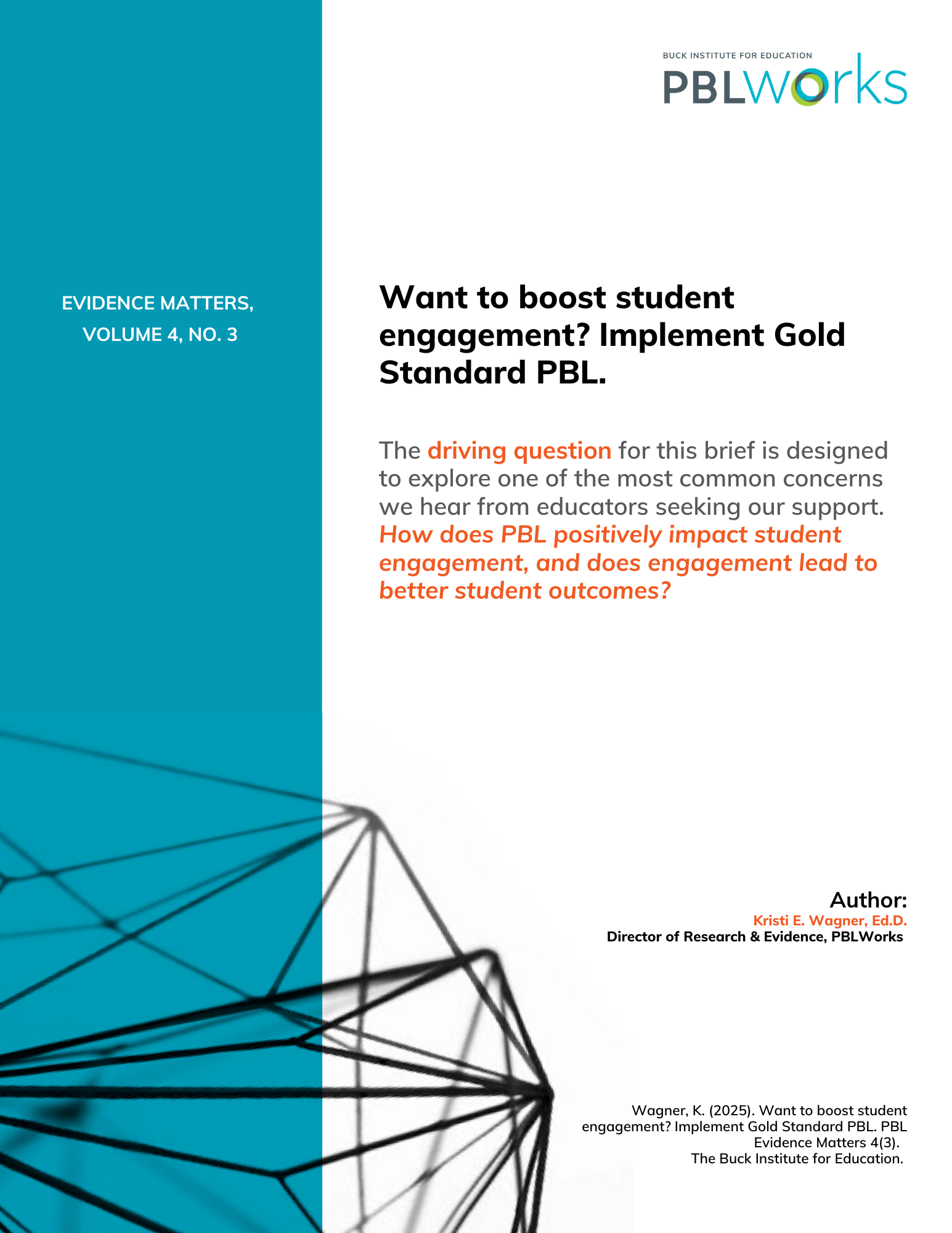 The driving question for this brief is designed to explore one of the most common concerns we hear from educators seeking our support. How does PBL positively impact student engagement, and does engagement lead to better student outcomes?
The driving question for this brief is designed to explore one of the most common concerns we hear from educators seeking our support. How does PBL positively impact student engagement, and does engagement lead to better student outcomes?
Citation: Wagner, K. (2025). Want to boost student engagement? Implement Gold Standard PBL. PBL Evidence Matters 4(3).
Organization: PBLWorks
Curriculum-Embedded Performance Assessment - An Update for Leaders
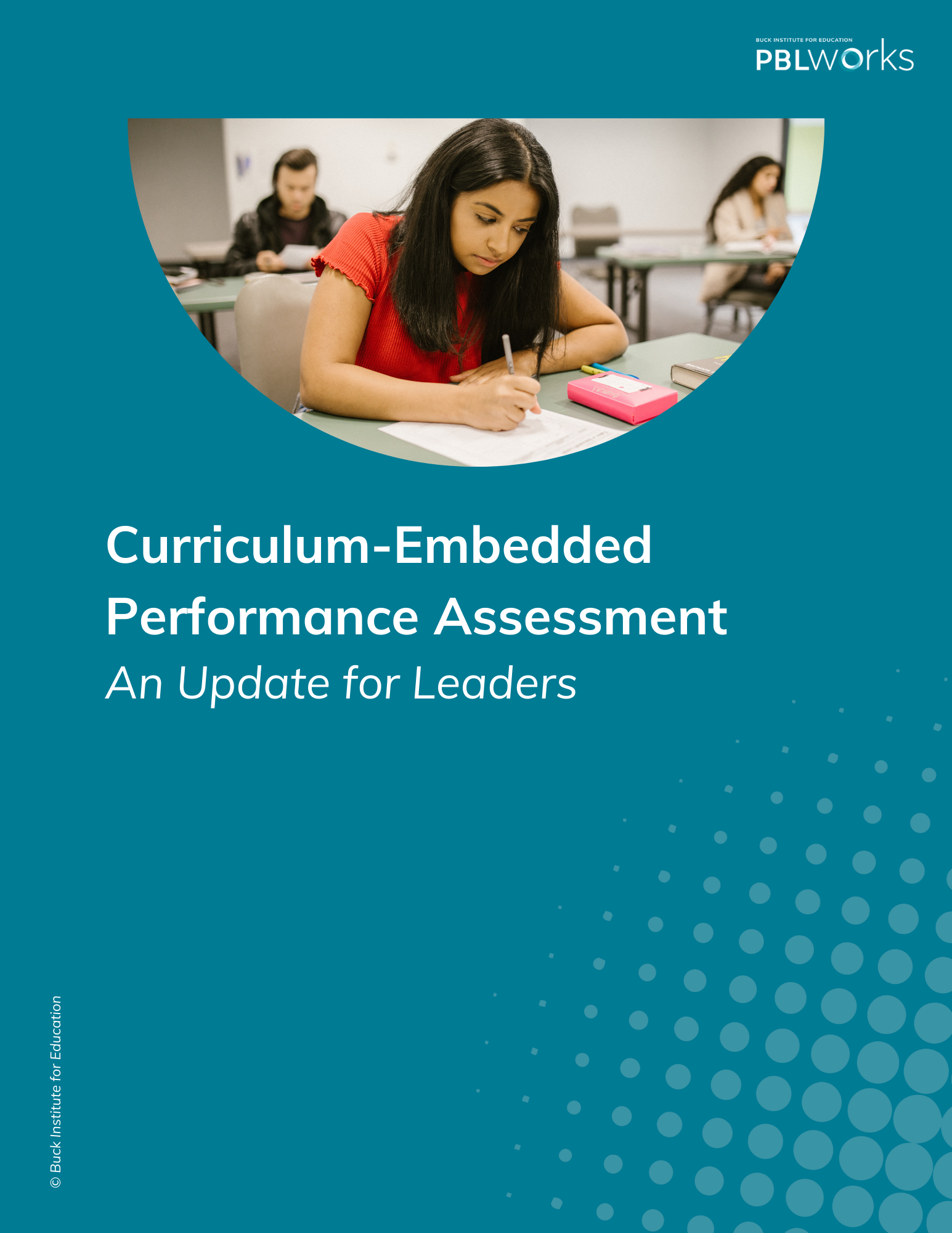 This PBLWorks white paper seeks to raise the issues associated with a shift to curriculum-embedded performance assessments that not only better prepare young people for the complexities of life but also provide more meaningful insights into the effectiveness of instruction and the quality of our schools. This white paper draws on the insights of leading experts and practitioners who demonstrate that incorporating performance assessments into the DNA of education is neither a novel experiment nor a leap of faith. On the contrary, a strong research base supports the efficacy and impact of these assessments, which are already in use in thousands of classrooms in the United States and around the world.
This PBLWorks white paper seeks to raise the issues associated with a shift to curriculum-embedded performance assessments that not only better prepare young people for the complexities of life but also provide more meaningful insights into the effectiveness of instruction and the quality of our schools. This white paper draws on the insights of leading experts and practitioners who demonstrate that incorporating performance assessments into the DNA of education is neither a novel experiment nor a leap of faith. On the contrary, a strong research base supports the efficacy and impact of these assessments, which are already in use in thousands of classrooms in the United States and around the world.
Gold Standard Project Based Learning designed as HQIM
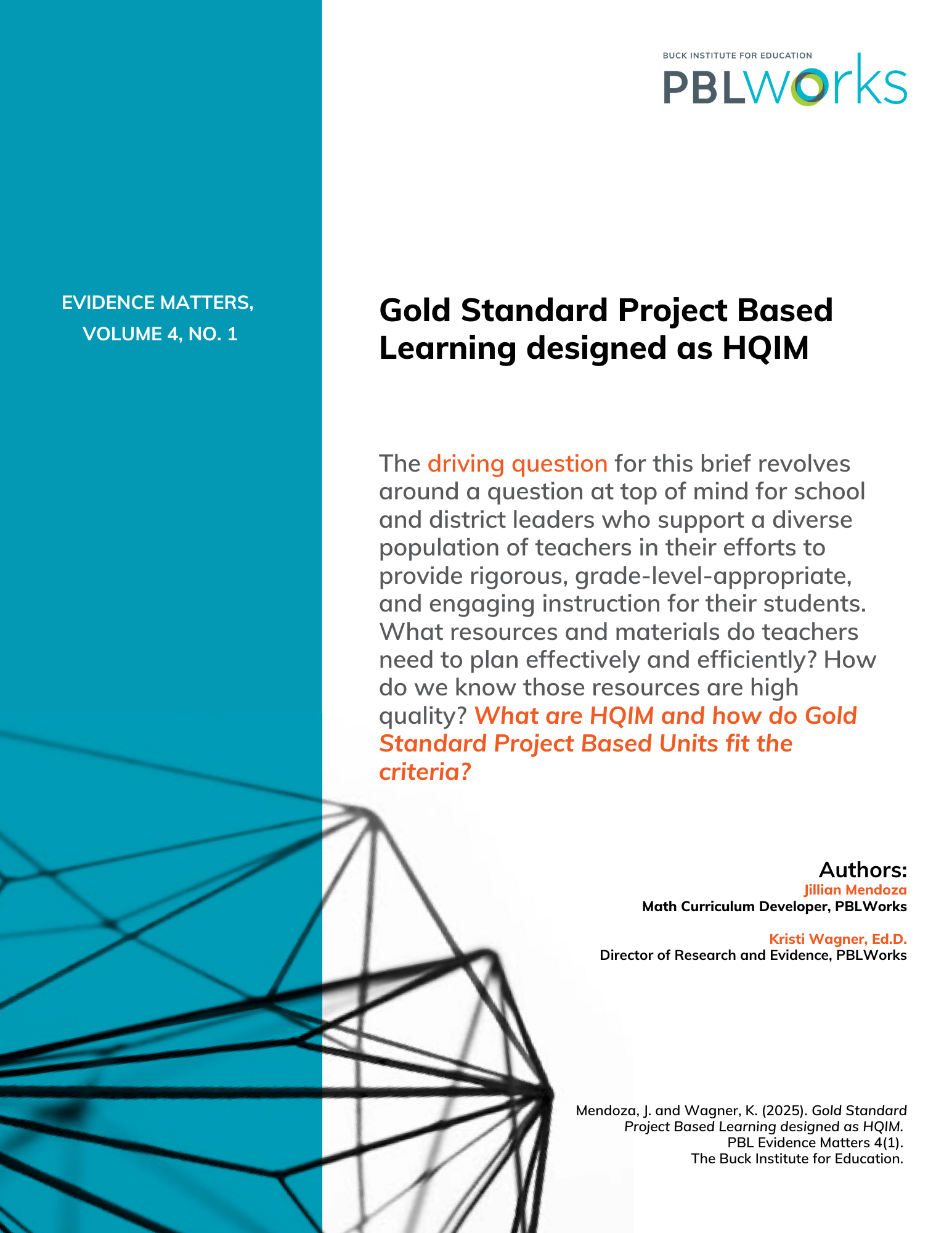 The driving question for this brief revolves around a question at top of mind for school and district leaders who support a diverse population of teachers in their efforts to provide rigorous, grade-level-appropriate, and engaging instruction for their students. What resources and materials do teachers need to plan effectively and efficiently? How do we know those resources are high quality? What are HQIM and how do Gold Standard Project Based Units fit the criteria?
The driving question for this brief revolves around a question at top of mind for school and district leaders who support a diverse population of teachers in their efforts to provide rigorous, grade-level-appropriate, and engaging instruction for their students. What resources and materials do teachers need to plan effectively and efficiently? How do we know those resources are high quality? What are HQIM and how do Gold Standard Project Based Units fit the criteria?
Citation: Mendoza, J. and Wagner, K. (2025). Gold Standard Project Based Learning designed as HQIM. PBL Evidence Matters 4(1). The Buck Institute for Education.
Organization: PBLWorks
Preventing Turnover, Increasing Retention: How PBL Professional Learning Can Help
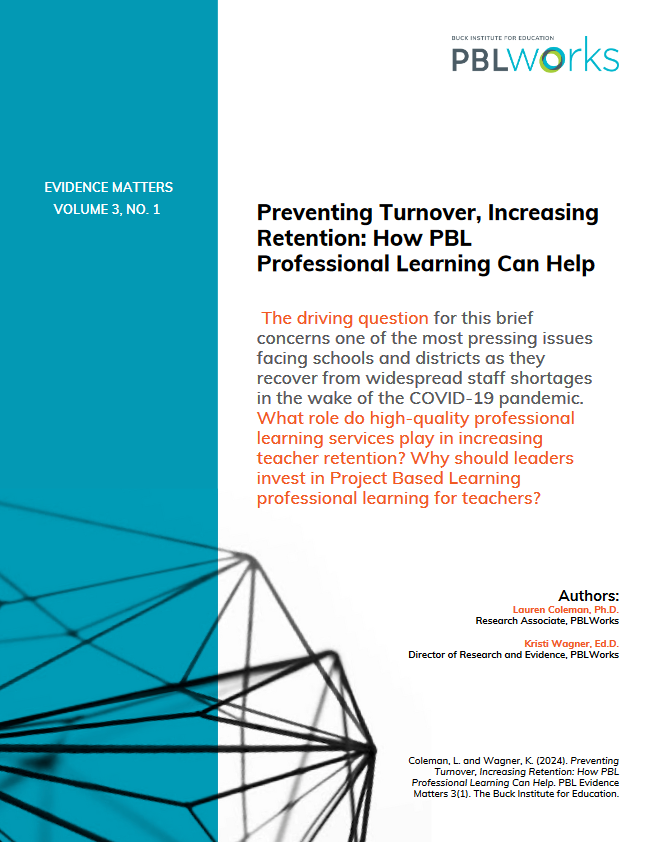 The driving question for this brief concerns one of the most pressing issues facing schools and districts as they recover from widespread staff shortages in the wake of the COVID-19 pandemic. What role do high-quality professional learning services play in increasing teacher retention? Why should leaders invest in Project Based Learning professional learning for teachers?
The driving question for this brief concerns one of the most pressing issues facing schools and districts as they recover from widespread staff shortages in the wake of the COVID-19 pandemic. What role do high-quality professional learning services play in increasing teacher retention? Why should leaders invest in Project Based Learning professional learning for teachers?
Citation: Coleman, L. and Wagner, K. (2024). Preventing Turnover, Increasing Retention: How PBL Professional Learning Can Help. PBL Evidence Matters 3(1). The Buck Institute for Education.
Organization: PBLWorks
PBL Develops Essential Digital Literacy Skills in the Post-COVID Landscape
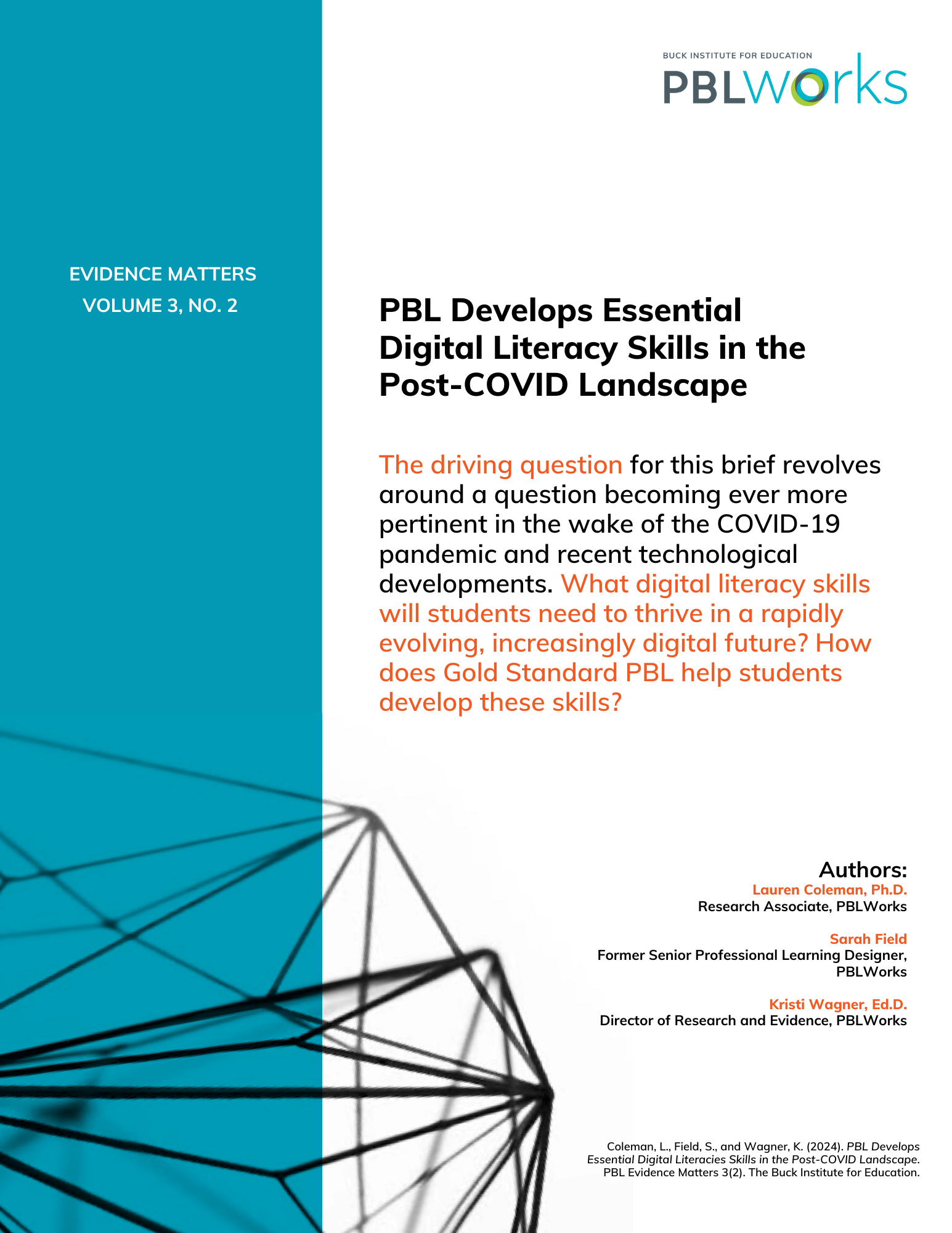
The driving question for this brief revolves around a question becoming ever more pertinent in the wake of the COVID-19 pandemic and recent technological developments. What digital literacy skills will students need to thrive in a rapidly evolving, increasingly digital future? How does Gold Standard PBL help students develop these skills?
Citation: Coleman, L., Field, S., and Wagner, K. (2024). PBL Develops Essential Digital Literacies Skills in the Post-COVID Landscape. PBL Evidence Matters 3(2). The Buck Institute for Education.
Organization: PBLWorks
School Leaders Play an Essential Role in Making High Quality PBL Happen for Students
The driving question for this brief is based on a common question that we are asked when schools and districts are planning for teacher Project Based Learning (PBL) professional learning. What role do school leaders play in PBL? Why should we invest in professional learning for school leaders?
Citation: Wagner, K. and Kingston, S. (2022). School Leaders Play an Essential Role in Making High Quality PBL Happen for Students. Why should we invest in professional learning for school leaders? PBL Evidence Matters 2(2).
The Buck Institute for Education.
Organization: PBLWorks
PBL and ESSA Evidence Levels
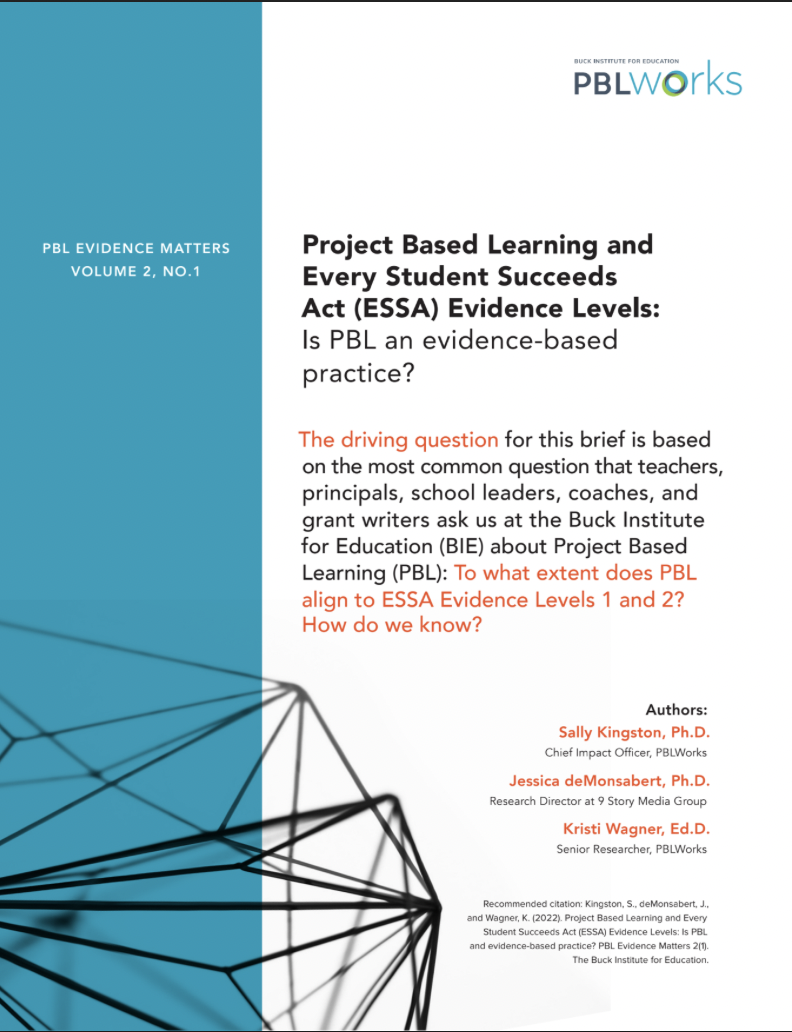 This brief is based on the most common question that teachers, principals, school leaders, coaches, and grant writers ask us at the Buck Institute for Education (BIE) about Project Based Learning (PBL): To what extent does PBL align to ESSA Evidence Levels 1 and 2? How do we know?
This brief is based on the most common question that teachers, principals, school leaders, coaches, and grant writers ask us at the Buck Institute for Education (BIE) about Project Based Learning (PBL): To what extent does PBL align to ESSA Evidence Levels 1 and 2? How do we know?
Citation: Kingston, S., deMonsabert, J., and Wagner, K. (2022). Project Based Learning and Every Student Succeeds Act (ESSA) Evidence Levels: Is PBL an evidence-based practice? PBL Evidence Matters 2(1). The Buck Institute for Education.
Organization: PBLWorks
Project-Based Learning Boosts Student Achievement in AP Courses
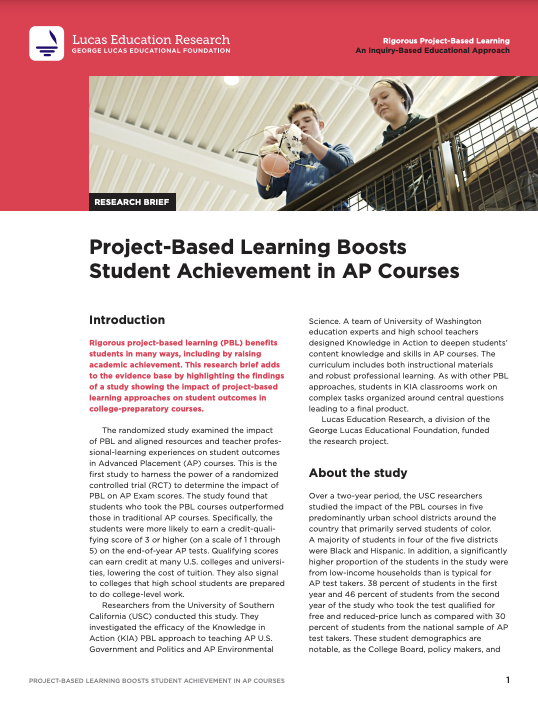 Knowledge In Action Study: This study is a randomized controlled trial (RCT) of 3,645 students in five large urban districts engaged in both AP Environmental Science and AP U.S. Government and Politics PBL courses and traditional courses. Researchers from the University of Southern California (USC) found that students in AP PBL courses outperformed students in traditional AP courses by 8 percentage points. PBLWorks provided the professional development for this study.
Knowledge In Action Study: This study is a randomized controlled trial (RCT) of 3,645 students in five large urban districts engaged in both AP Environmental Science and AP U.S. Government and Politics PBL courses and traditional courses. Researchers from the University of Southern California (USC) found that students in AP PBL courses outperformed students in traditional AP courses by 8 percentage points. PBLWorks provided the professional development for this study.
Results for students from low-socioeconomic backgrounds were comparable to their peers from higher socioeconomic backgrounds. For teachers who taught AP PBL for a second year, students in the AP PBL courses outperformed peers in traditional classrooms by 10 percentage points. PBLWorks designed and facilitated professional development for this study.
Citation: Saavedra, A.R., Liu Y., Haderlein, S.K., Rapaport, A., Garland, M., Hoepfner, D., Morgan, K.L., Hu, A., & Lucas Education Research. (2021). Project-Based Learning Boosts Student Achievement in AP Courses. Lucas Education Research.
Success Skills Literature Reviews
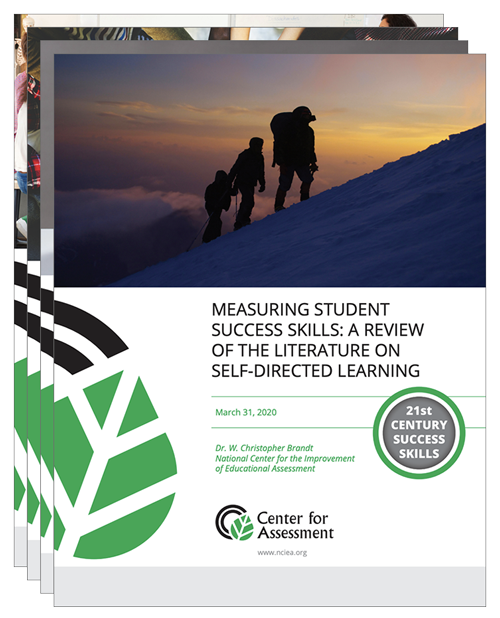 In partnership with PBLWorks, The National Center for Improvement of Educational Assessment (Center for Assessment), conducted comprehensive reviews of the literature for four success skills: critical thinking, collaboration, self-directed learning, and complex communication.
In partnership with PBLWorks, The National Center for Improvement of Educational Assessment (Center for Assessment), conducted comprehensive reviews of the literature for four success skills: critical thinking, collaboration, self-directed learning, and complex communication.
Research-based rubrics were developed based on these literature reviews. The rubrics are designed to provide useful, formative information that teachers can use to guide instruction and provide feedback to students and that they can use to reflect on their performance. Rubrics for each success skill are available by grade span: K-2, 3-5, and 6-12. (The K-2 rubric includes both a teacher version and a version for primary students or early readers.)
State of PBL White Paper & Infographic
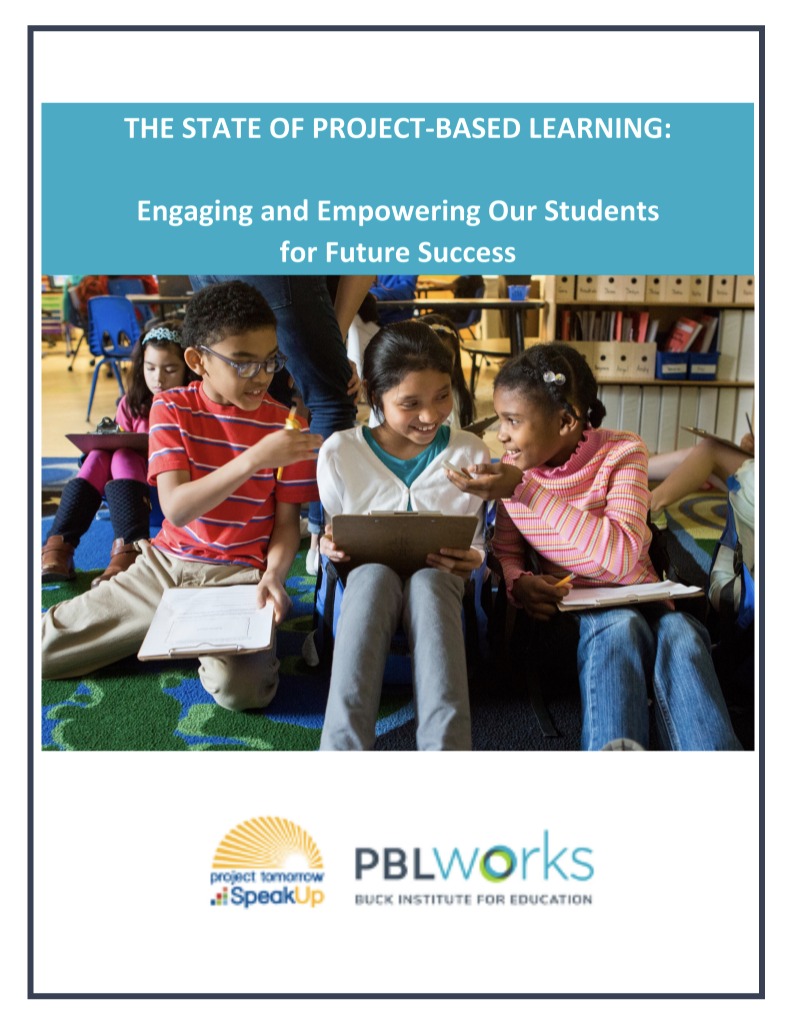 The State of PBL white paper and infographic summarize the findings of the 2019-2020 Speak Up Research conducted by Project Tomorrow. The Speak Up Research Project is a national research to help educators, policymakers, and business leaders make better decisions about how to support new learning experiences for students.
The State of PBL white paper and infographic summarize the findings of the 2019-2020 Speak Up Research conducted by Project Tomorrow. The Speak Up Research Project is a national research to help educators, policymakers, and business leaders make better decisions about how to support new learning experiences for students.
BetterLesson & PBLWorks Professional Learning at Lindsay Unified School District
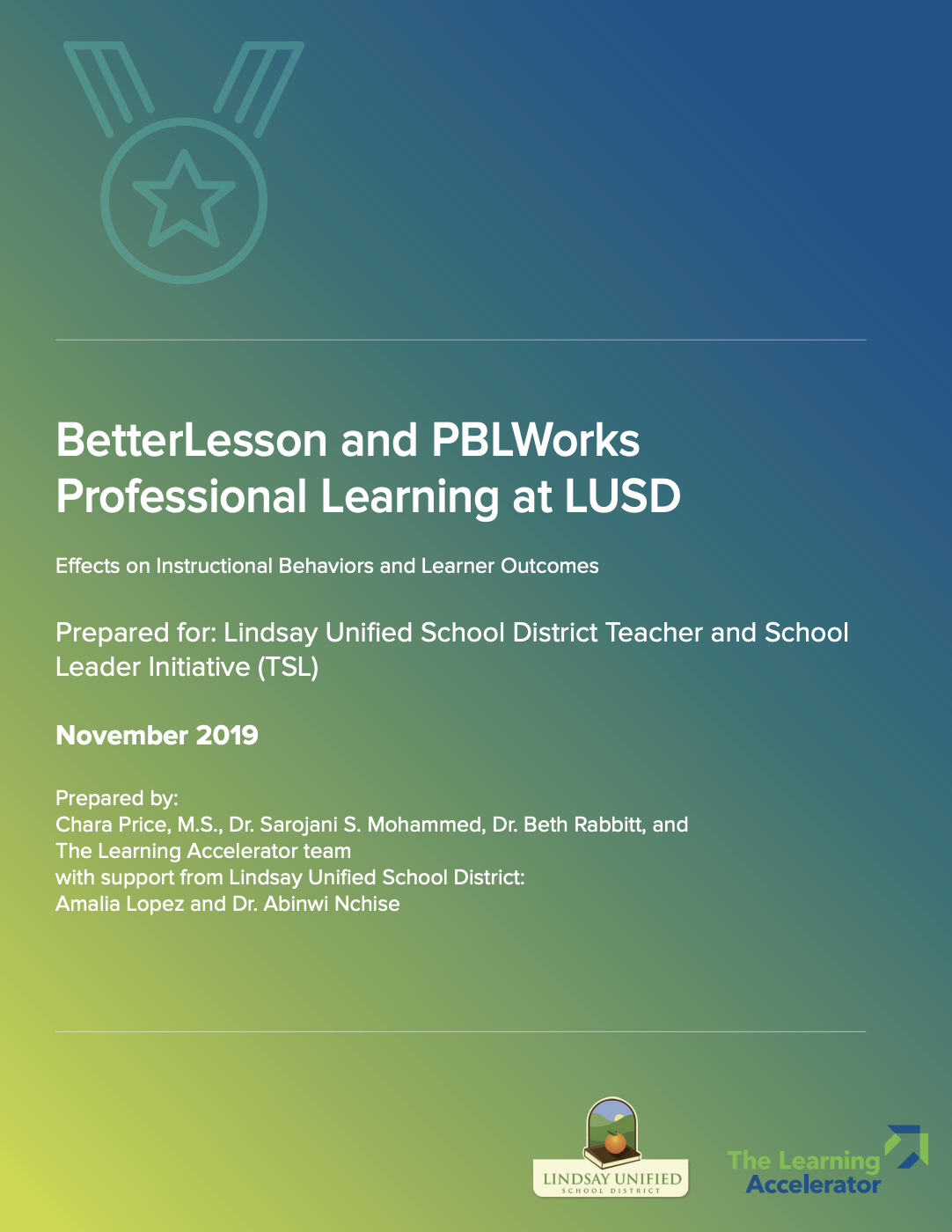 This comparison cohort study examines the impact of professional learning, including PBLWorks professional services, on K-12 learners in Lindsay Unified School District in Lindsay, California. The study found that students with teachers who participated in PBLWorks professional learning between 2017 and 2019 demonstrated statistically significant growth in reading, math, and history, when compared to peers whose teachers did not participate in professional learning.
This comparison cohort study examines the impact of professional learning, including PBLWorks professional services, on K-12 learners in Lindsay Unified School District in Lindsay, California. The study found that students with teachers who participated in PBLWorks professional learning between 2017 and 2019 demonstrated statistically significant growth in reading, math, and history, when compared to peers whose teachers did not participate in professional learning.
View summary by PBLWorks (pdf)
Citation: Price, C., Mohammed, S., Rabbit, B., (2019). BetterLesson and PBLWorks professional learning at LUSD: Effects on instructional behaviors and learning outcomes. Prepared for: Lindsay Unified School District Teacher and School Leader Initiative (TSL). Retrieved from: https://www.lindsay.k12.ca.us/view/12031.pdf
Source Organization: Lindsay Unified School District
Student Outcomes from High-Quality Project-Based Learning: A Case Study for PBLWorks
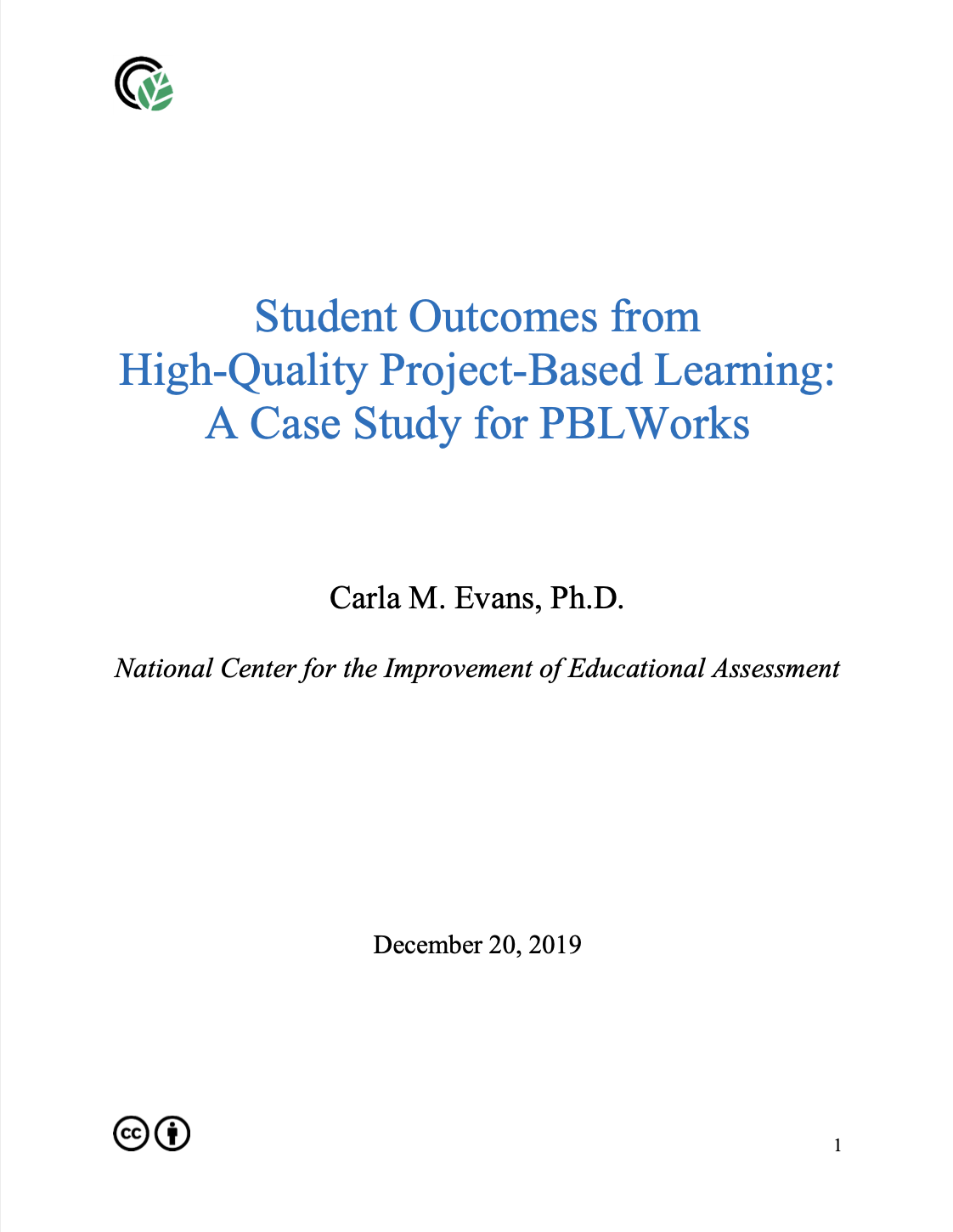 This single case study examines one teacher’s PBL journey across a continuum of outcomes from PBL 101 through student outcomes, based on PBLWorks' teacher theory of action. Results show positive results for students in science, collaboration, self-direction.
This single case study examines one teacher’s PBL journey across a continuum of outcomes from PBL 101 through student outcomes, based on PBLWorks' teacher theory of action. Results show positive results for students in science, collaboration, self-direction.
Citation: Evans, C. M. (2019). Student Outcomes from High-Quality Project-Based Learning: A Case Study for PBLWorks. Dover, NH: Center for Assessment.
Source Organization: National Center for the Improvement of Educational Assessment (Center for Assessment).
Project Based Learning & Student Achievement: What Does the Research Tell Us?
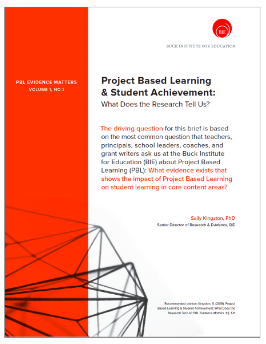 This short research brief summarizes evidence of the impact of Project Based Learning on student learning in core content areas. The driving question for this brief is based on the most common question that teachers, principals, school leaders, coaches, and grant writers ask us at PBLWorks about Project Based Learning: What evidence exists that shows the impact of Project Based Learning on student learning in core content areas?
This short research brief summarizes evidence of the impact of Project Based Learning on student learning in core content areas. The driving question for this brief is based on the most common question that teachers, principals, school leaders, coaches, and grant writers ask us at PBLWorks about Project Based Learning: What evidence exists that shows the impact of Project Based Learning on student learning in core content areas?
Citation: Kingston, S. (2018). Project Based Learning & Student Achievement: What Does the Research Tell Us? PBL Evidence Matters. 1(1), 1-11.
Source Organization: PBLWorks
Additional Research Publications
-
Multiple-Literacies PBL (ML-PBL)
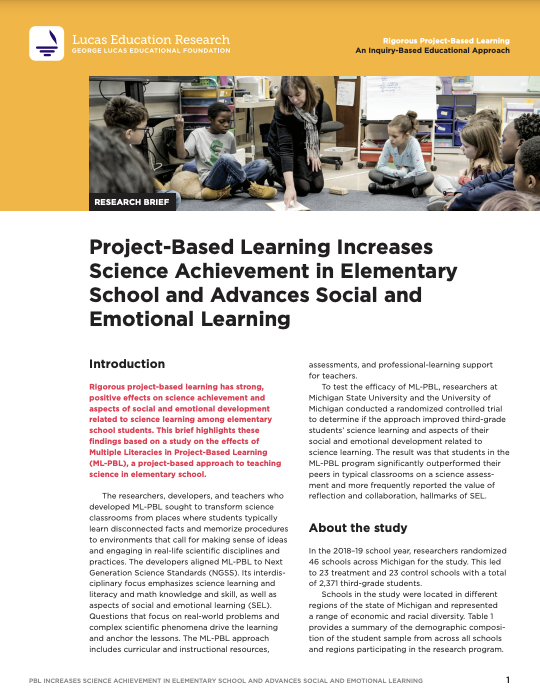 This randomized controlled trial of 2,371 third-grade students in 46 schools engaged in interdisciplinary PBL units emphasizing science, mathematics, and literacy as well as social emotional learning (SEL) and traditional instruction. Of the schools in the study, 62% of students qualified for free and reduced-price lunch, and 58% were students of color. Researchers from Michigan State University and the University of Michigan found that students in the ML-PBL program significantly outperformed their peers in traditional instruction in science by 8 percentage points on average. Students engaged in ML-PBL units also reported the value of reflection and collaboration more frequently than their peers in traditional instruction. These results held across socioeconomic levels and reading levels.
This randomized controlled trial of 2,371 third-grade students in 46 schools engaged in interdisciplinary PBL units emphasizing science, mathematics, and literacy as well as social emotional learning (SEL) and traditional instruction. Of the schools in the study, 62% of students qualified for free and reduced-price lunch, and 58% were students of color. Researchers from Michigan State University and the University of Michigan found that students in the ML-PBL program significantly outperformed their peers in traditional instruction in science by 8 percentage points on average. Students engaged in ML-PBL units also reported the value of reflection and collaboration more frequently than their peers in traditional instruction. These results held across socioeconomic levels and reading levels.Citation: Krajcik, J., Schneider, B., Miller, E., Chen, I.C., Bradford, L., Bartz, K., Baker, Q., Palincsar, A., Peek-Brown, D., Codere, S., & Lucas Education Research. (2021). Project-Based Learning Increases Science Achievement in Elementary Schools and Improves Social and Emotional Learning. Lucas Education Research.
-
Putting PBL to the Test
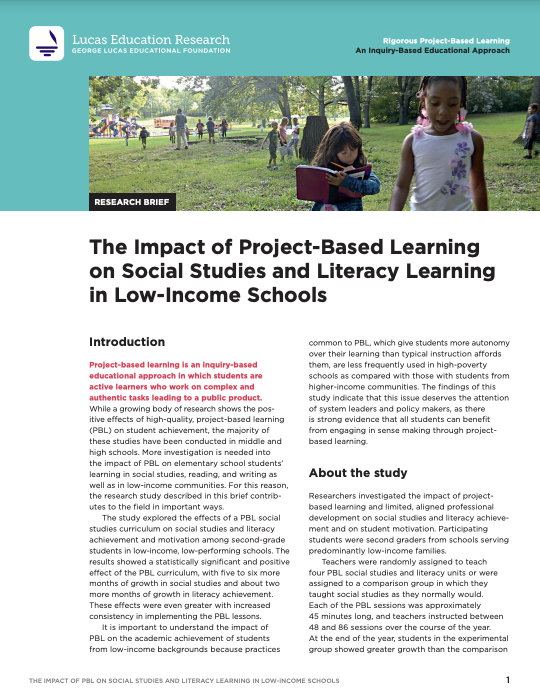 This study investigated the impact of PBL on social studies and literacy achievement and motivation of students in second grade in high poverty and low performing districts as part of a Project PLACE: A Project Approach to Literacy and Civic Engagement. PLACE is a second-grade Project Based Learning program that integrates social studies and content literacy. Researchers found that PBL can raise student achievement in high-poverty communities. Specifically, the gains made by the PBL group were 63% higher in social studies and 23% higher in informational reading than the control group.
This study investigated the impact of PBL on social studies and literacy achievement and motivation of students in second grade in high poverty and low performing districts as part of a Project PLACE: A Project Approach to Literacy and Civic Engagement. PLACE is a second-grade Project Based Learning program that integrates social studies and content literacy. Researchers found that PBL can raise student achievement in high-poverty communities. Specifically, the gains made by the PBL group were 63% higher in social studies and 23% higher in informational reading than the control group.Citation: Duke, N.K., Halvorsen, A-L., Strachan, S.L., Kim, J., & Konstantopoulos, S. (June 2020). Putting PjBL to the Test: The Impact of Project-Based Learning on Second Graders’ Social Studies and Literacy Learning and Motivation in Low-SES School Settings. American Educational Research Journal. doi.org/10.3102/0002831220929638
-
Learning Through Performance (LTP) in Middle School Science
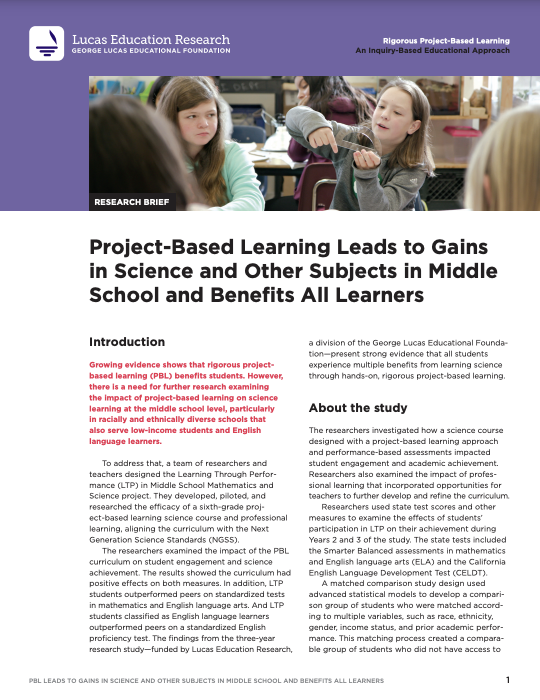 The matched comparison group study of 6th-grade science students (139 LTP, 145 comparisons) showed that students in LTP classrooms demonstrated increased engagement and outperformed their peers from 8-28 percentage points on various academic assessments. The study was conducted in high-poverty, racially diverse schools and provides important evidence about the effects of PBL on traditionally underserved students, including English language learners.
The matched comparison group study of 6th-grade science students (139 LTP, 145 comparisons) showed that students in LTP classrooms demonstrated increased engagement and outperformed their peers from 8-28 percentage points on various academic assessments. The study was conducted in high-poverty, racially diverse schools and provides important evidence about the effects of PBL on traditionally underserved students, including English language learners.Citation: Deutscher, R.R., Holthuis, N.C., Maldonado, S.I., Pecheone, R.L., Schultz, S.E., Wei, R.C., & Lucas Education Research. (2021). Project-Based Learning Leads to Gains in Science and Other Subjects in Middle School and Benefits All Learners. Lucas Education Research
-
Shifting to Project Based Learning in the Advanced Placement Context
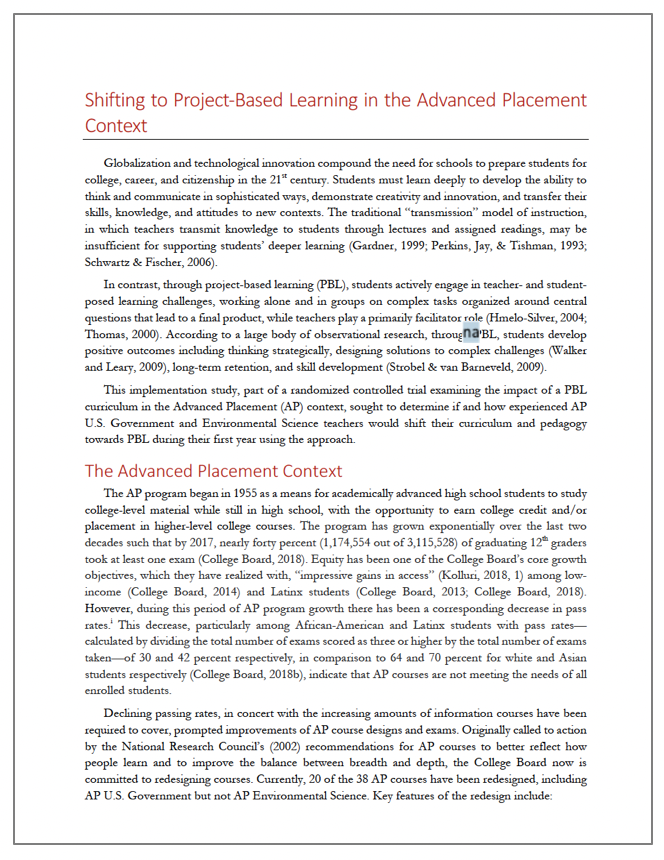
This unpublished manuscript describes how experienced Advanced Placement (AP) Environmental Science and U.S. Government treatment teachers, participating in a large-scale randomized controlled trial, shifted their practice toward the Knowledge in Action (KIA) project-based learning approach. Results show that, under conditions of optimal support and compared to randomly-assigned, business-as-usual control teachers, treatment teachers shifted towards greater emphasis on deeper learning objectives, more student-centered pedagogy, more authenticity, and less lecture and explicit examination-preparation. Though the shift was challenging, students reported feeling prepared for the relevant AP examination, and over ninety percent of teachers recommended the approach.
Citation: Saavedra, A., Rapaport, A.,Marwah, E., Carle, J., Liu, Y., Johnson, S. J., Li, J., Hoepfner, D., Garland, M. (2019). Shifting to project-based learning in the Advanced Placement context. Unpublished manuscript.
Source Organization: University of Southern California
-
Project Based Learning: A Literature Review
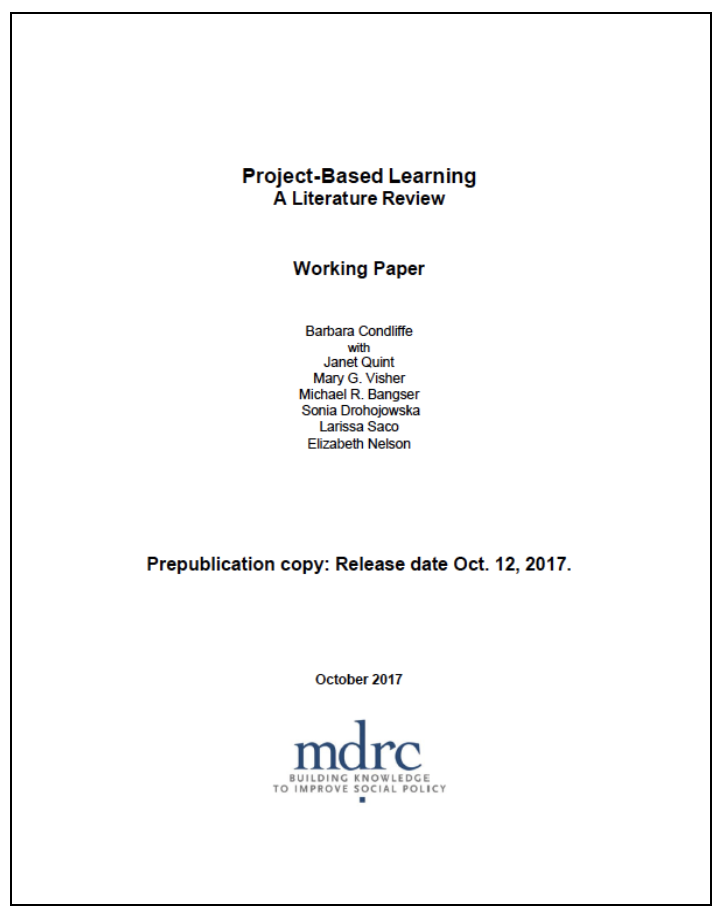 This review primarily includes studies published from 2015 to 2017 focused on PBL implementation and its effects on student outcomes. This review suggests there are a growing number of studies that show a positive relationship between PBL and student learning outcomes, and this evidence is “promising, not proven.” Some studies show positive effects on students’ engagement, motivation, and self-efficacy. This review focuses on underlying PBL principles, PBL in K-12 settings, implementation challenges, enabling school and district factors, and evidence of effectiveness.
This review primarily includes studies published from 2015 to 2017 focused on PBL implementation and its effects on student outcomes. This review suggests there are a growing number of studies that show a positive relationship between PBL and student learning outcomes, and this evidence is “promising, not proven.” Some studies show positive effects on students’ engagement, motivation, and self-efficacy. This review focuses on underlying PBL principles, PBL in K-12 settings, implementation challenges, enabling school and district factors, and evidence of effectiveness.Citation: Condliffe, B., Quint, J., Visher, M.G., Bangser, M. R., Drohojowska, S. Saco, L., and Nelson, E. (2017). Project Based Learning: A Literature Review, 1-78. New York, NY: MDRC.
Source Organization: MDRC/Lucas Education Research
-
A Review of the Research on Project-Based Learning
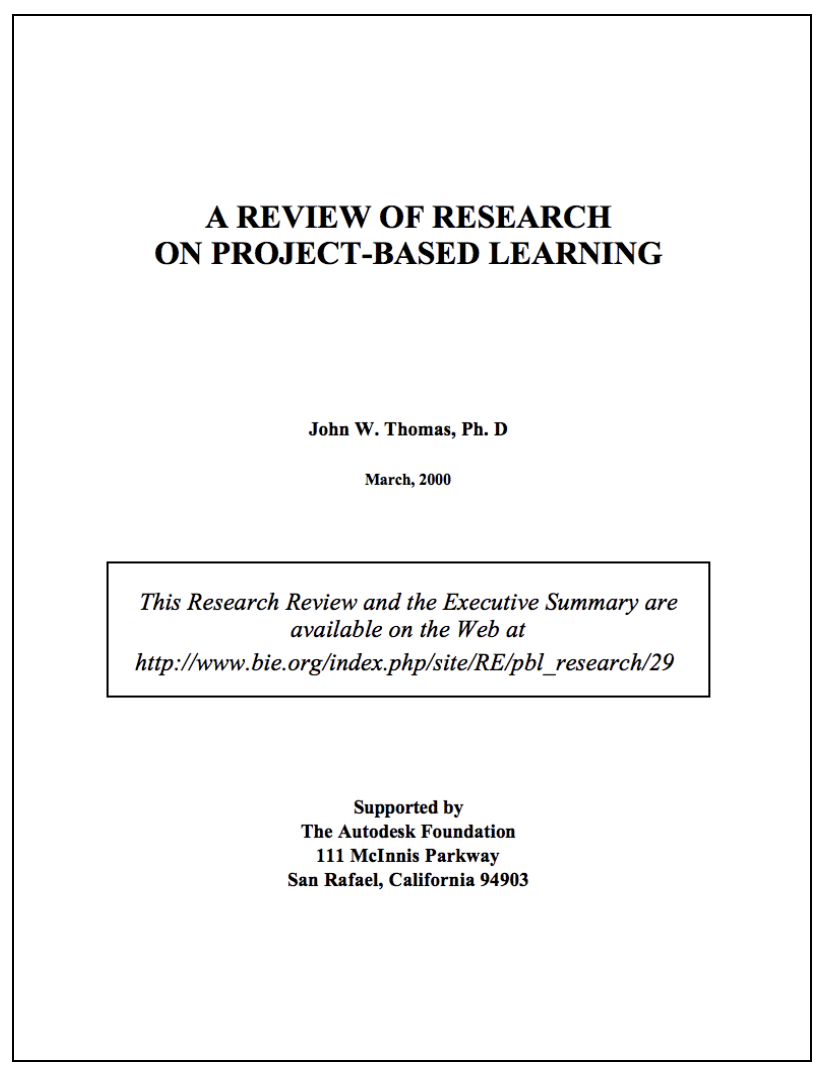 This review covers research studies published between 1984 and 1999 conducted at the elementary and secondary levels that focus on project-based learning, problem-based learning, and Expeditionary Learning. This review focuses on research on PBL practices that meet five criteria: centrality, driving question, constructivist investigations, autonomy, and realism. Key topics in this review include definitions of Project-Based Learning, underpinnings of PBL research and practice, student characteristics and PBL, implementation challenges, and effectiveness research.
This review covers research studies published between 1984 and 1999 conducted at the elementary and secondary levels that focus on project-based learning, problem-based learning, and Expeditionary Learning. This review focuses on research on PBL practices that meet five criteria: centrality, driving question, constructivist investigations, autonomy, and realism. Key topics in this review include definitions of Project-Based Learning, underpinnings of PBL research and practice, student characteristics and PBL, implementation challenges, and effectiveness research.Citation: Thomas, J. W. (2000). A Review of the Research on Project-Based Learning, 1-45. San Rafael, CA: The Autodesk.
Source Organization: The Autodesk Foundation
-
Research Briefs: What Can We Learn from John Hattie about Project Based Learning?
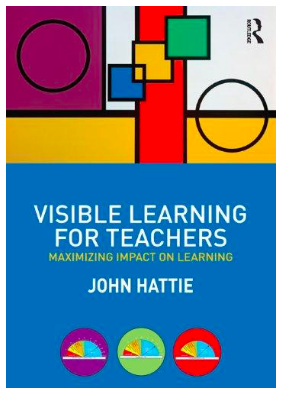
This four-part series highlights research by John Hattie that supports Project Based Teaching. John Hattie’s research is based on more than 1000 meta-analyses – a statistical method that combines the results of separate research studies – Hattie has drawn conclusions about the factors that make the most difference in student learning. He bases these conclusions on research that has involved more than 240 million students.
Part 1 focuses on understanding Hattie’s research findings. Part 2 describes how Hattie’s findings support Project Based Teaching. Parts 3 and 4 describe what Hattie’s research says about effective feedback and practical guidance for applying the research in practice.
Citation: Mergendoller, J. R. (2016). What Can We Learn from John Hattie about Project Based Learning? Novato, CA: PBLWorks.
Source Organization: PBLWorks

